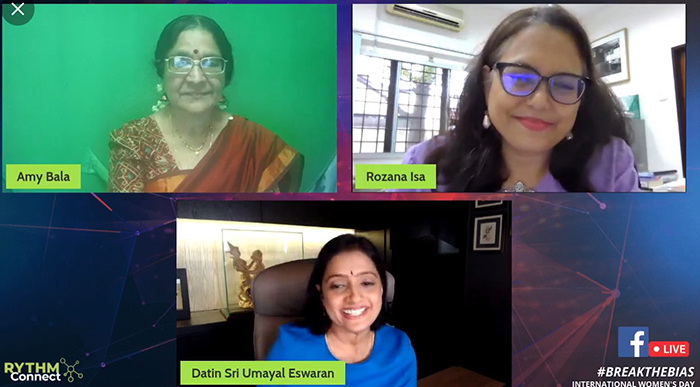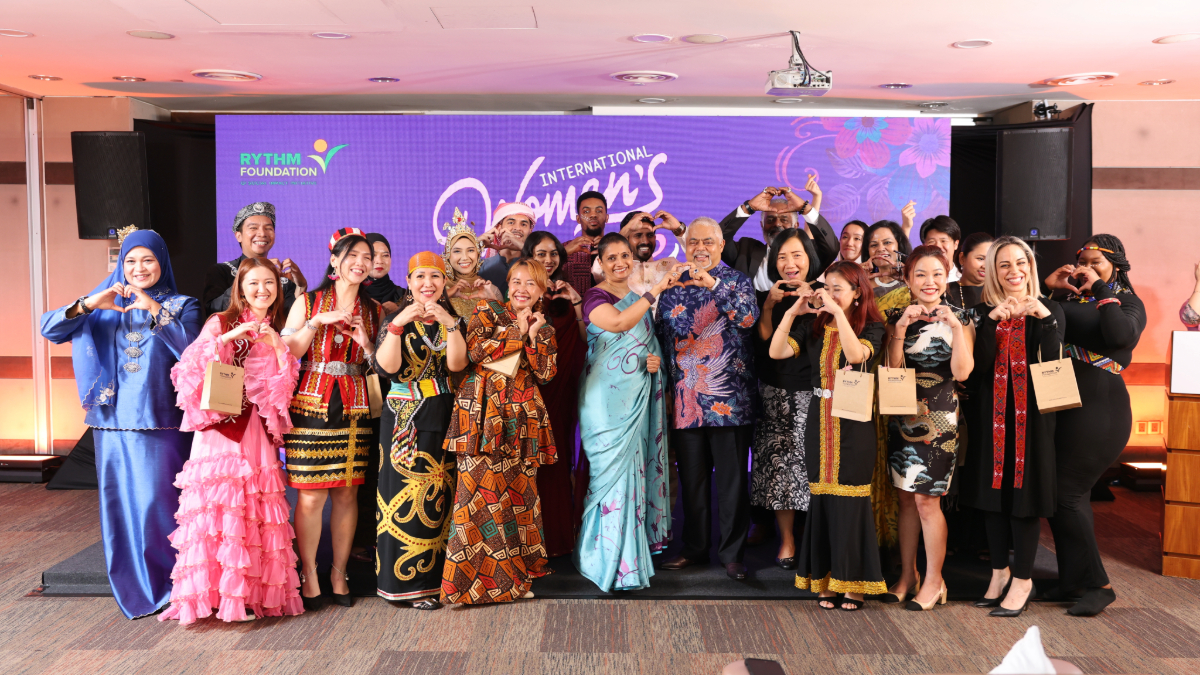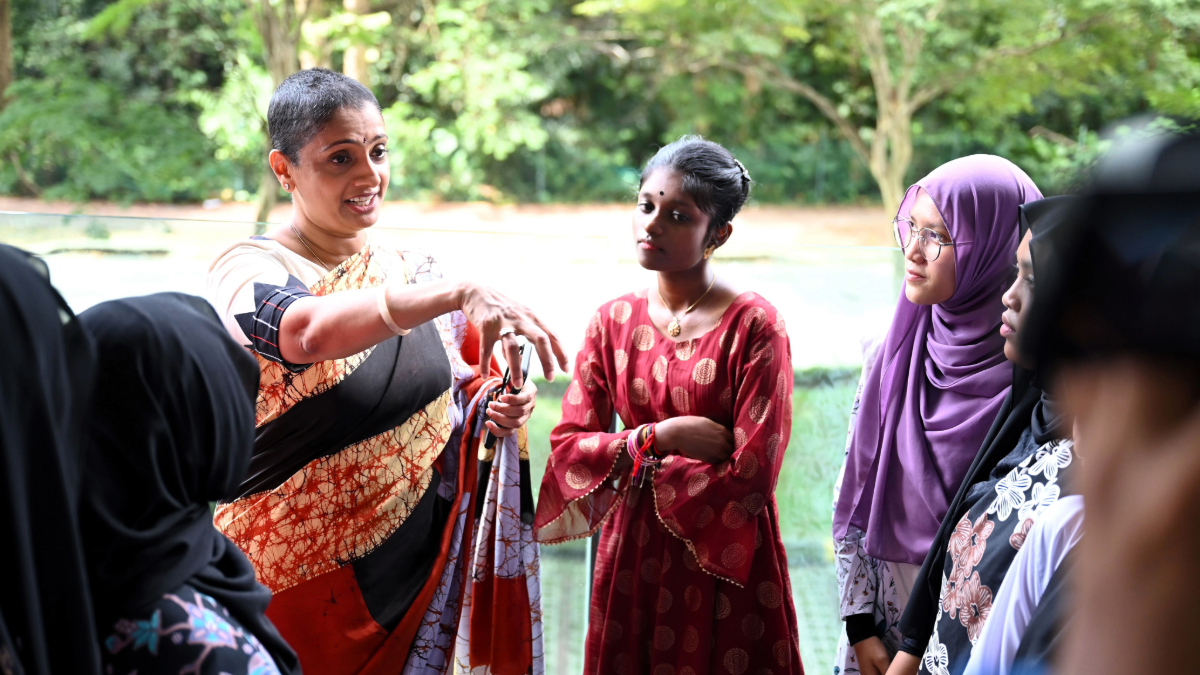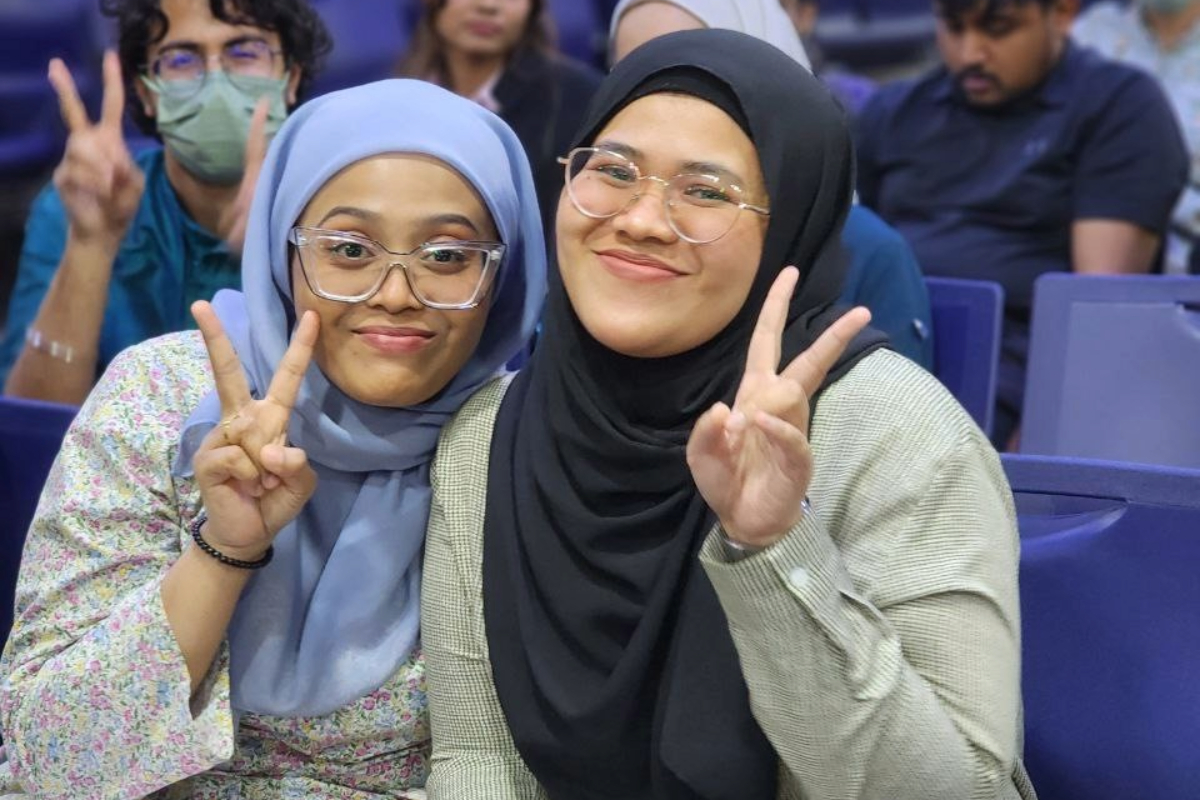The latest episode of #RYTHMConnect discussed creating a gender-equal world free of bias and discrimination.
Gender equality is not only a fundamental human right but a necessary foundation for a peaceful, prosperous, and sustainable world.
According to the United Nations (UN), progress has occurred over the last decades: more girls are going to school, fewer girls are forced into early marriage, more women are serving in parliament and leadership positions, and laws are being reformed to advance gender equality.
However, many challenges remain: discriminatory laws and social norms remain pervasive. Women also continue to be underrepresented in political and other levels of leadership.
The latest episode of #RYTHMConnect entitled ‘#BreakTheBias to Achieve Gender Equality for a Better World’ recently discussed these concerns. #RYTHMConnect is the Foundation’s online conversation series with partners, subject matter experts, and social activists on topics that matter. #BreakTheBias reflects this year’s International Women’s Day (IWD) theme.
RYTHM Chairperson Datin Sri Umayal Eswaran facilitated a crucial talk on creating a gender-equal world free of bias, stereotypes, and discrimination with two formidable Malaysian female rights and gender equality advocates: Rozana Isa, executive director of Sisters in Islam (SIS), and Amy Bala, a child protection specialist with social enterprise ENGENDER Consultancy.
Rozana’s work with civil society organisation SIS includes addressing human rights issues, violence against women, and advancing their rights within the Islamic framework. Amy is a children’s rights and safety advocate with 40-plus years of experience tackling social issues and early childhood development.
Datin Sri Umayal set the scene by quoting American civil rights activist Maya Angelou. “Each time a woman stands up for herself, without knowing it possibly, without claiming it, she stands up for all women.
“At RYTHM, we believe that the first step towards change is education and awareness, and how that leads to creating a gender-equal world. As we discuss breaking the biases women face daily, we hope it brings us closer to an equitable and inclusive world where differences are valued and celebrated.”
The discussion commenced with the guests defining what gender equality meant to them.
“Gender equality is something women’s groups in Malaysia have been struggling to realise in the long term. We have difficulty ensuring that equality is recognised in our laws and manifested in our lives,” Rozana said.
She noted that it was imperative to have visibility and certainty in legislation that states there should be no discrimination between genders.
“We have this guaranteed in our constitution, but it is still not enough to realise this in our laws, policies, and lived realities. Therefore, it’s essential to have the (proposed) Gender Equality Act spell out what equality is for women.”
Amy has witnessed countless discrimination between the two genders as a social worker. “When discussing gender, people think it’s only about women. It’s not. It’s (about) boys and girls, men and women.
“Many people tend to separate the two and characterise one against the other. However, when you look at social issues, boys are viewed differently from girls.
“It’s good that we want to break this bias. Only then can we look at equality and how the next generation can be better than the current one,” Amy added.
Datin Sri Umayal also raised the issue of pervasive biasness in the workplace. “If you stand up and try to break that bias, you are told you shouldn’t come out fierce or strong but gentle and graceful. That’s not right because everyone has their strengths.”
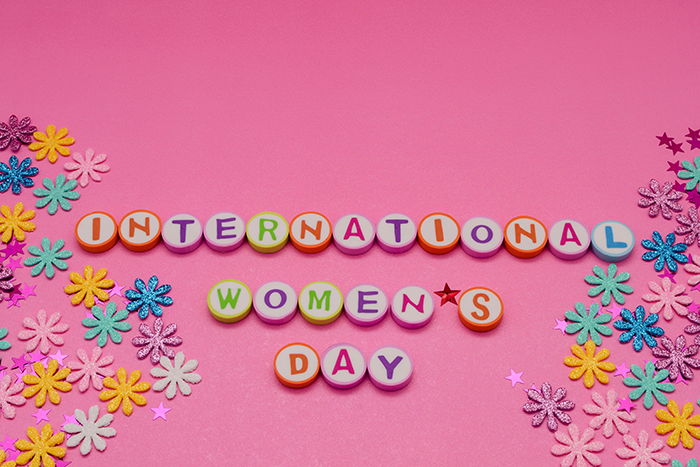
This year’s International Women’s Day theme is ‘Break the Bias’.
Rozana echoed this perspective. “There needs to be a safe space in the workplace. It would help if you gave enough opportunities for the other person to voice their opinion. It should be acceptable if it is objective and something for the betterment of a project or the company. You shouldn’t say a woman is opinionated because she’s a woman.”
“What women need are opportunities. It is not about forcing women to go into male-dominated fields. Women should do whatever they want and do it well. They need the options,” Amy explained.
The panel agreed that teaching children about gender equality and respect is a way to impart positive mindsets and unlearn gender-discriminatory behaviours from an early age.
“At RYTHM, we believe breaking the cycle of biases, stereotypes, and discrimination must start as early as childhood. That means education begins at home,” Datin Sri Umayal said.
“Children need excellent role models who walk their talk. For example, a person can advocate for rights outside the home but should do the same at home. The two should go together. The same applies in the workplace. There’s a problem with management that talks about equality and progress but is not walking the talk,” Rozana said.
The discussion also covered achieving gender equality through sex education and conversations with the young about consent, body image, self-esteem, marriage, and relationships.
“We debate whether we should discuss sex education as if it’s not part of the human race. But instead, we should teach children examples and talk about them openly, so they are informed. It worsens when we hide it in a closet rather than facilitate open discussion,” Datin Sri Umayal observed.
“While we emphasise teaching the girls to respect their bodies, we should also teach boys to respect their own and others’ bodies. So, it should go both ways,” Amy stated.
Rozana described bodily autonomy as a critical issue. “It is essential, especially considering what we have seen during the pandemic and the problem with vaccinations. Some husbands did not want their wives vaccinated because they thought it was unsafe. Some even believed it dangerous for their expecting wives – even if the women believed otherwise. So the whole issue of authority needs to be dismantled.”
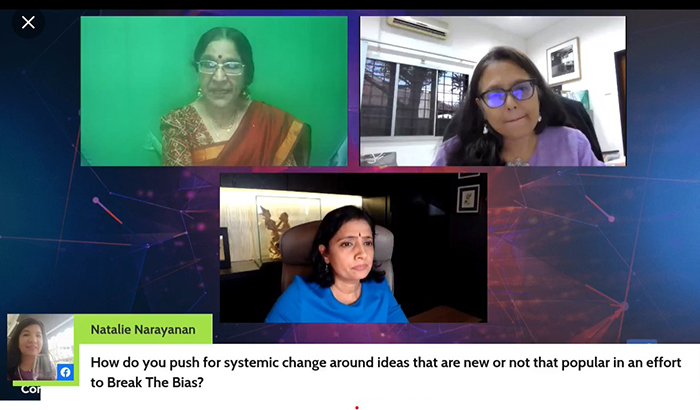
Amy Bala (top left) and Rozana Isa (right) answer questions posed by the audience.
The guests also answered several interesting questions from the audience watching the discussion. On how systemic change around new or unpopular ideas could be pushed to break the bias, Rozana cited the issue of child marriages.
“This is something that should not happen in our times anymore. While raising the minimum marriage age is crucial, some communities must be convinced that child marriages are bad for young girls.
“Their physiology is not ready for physical, mental, and sexual changes. Therefore, changing cultural beliefs need to go hand in hand with formal change.”
Amy likened organisations to jigsaw puzzles to a question on how the positive impact of having women in organisations and leadership roles could be calculated. “Everyone has a role in this puzzle. Look at the relevant skills of everyone. I don’t think you will have to figure out what the women and men contributed. It must be a team effort.
Rozana chimed in, “Look at the annual performance of women in projects or team-making discussions. You can then see the impact of women in decision-making and its effect on the company when you compare it annually.”
Datin Sri Umayal concluded the discussion by stating, “We want to break the bias for men and women to come together as one. We want to share that equal partnership, whether you are husband and wife, brother and sister, or a friend to each other. We must learn to respect each other’s strengths and weaknesses and have empathy, love, compassion, and tolerance for one another.”
The dialogue also underlined the participants’ belief that gender equality is not about favouring one gender over another. Instead, it is about ensuring everyone can live harmoniously and treat one another with respect and justice.
Watch the ‘#BreakTheBias to Achieve Gender Equality for a Better World’ discussion in the video below:
5 Ways to Honour Women
World-renowned feminist, journalist and activist Gloria Steinem once said, “The story of women’s struggle for equality belongs to no single feminist, nor to any one organisation, but to the collective efforts of all who care about human rights.”
So, make the commemoration yours and do what you can to make a positive difference for women. Here are a few ways to mark IWD and Women’s History Month throughout March and beyond.
Mentor or Sponsor a Female Colleague
According to 30 % Club, a voluntary organisation of senior professionals that aims to boost the number of women in executive leadership, women’s representation on the top 100 public listed boards in Malaysia increased from 24% in 2018 to 26% in 2021. In addition, according to Grant Thornton International’s Women in Business research, Malaysia has the highest number of women holding senior management positions at 40%, a three-percentage point jump from last year.
“Time and again, research shows that the more diverse a company, the better its performance. It’s that simple,” said Ann Cairns, 30% Club global chair. Naturally, more could certainly be done. Women can be powerful allies for other women in the workplace. As a mentor in an influential position, you can support, advise, and advocate for your colleague to a level-playing field and go further faster.
Learn More About Women’s Empowerment
There are several ways to learn more about extraordinary women. For one, consider getting a new or immensely popular bestseller to honour famous and inspirational women by learning more about them, their experiences, and their impact on society.
By most accounts, the following (in no particular order and by no means exhaustive) are among the most popular books that underline inspiring stories of women’s empowerment, equality, and achievements: Becoming by Michelle Obama; Feminism and the Women’s Movement in Malaysia: An Unsung Revolution by Cecilia Ng, Maznah Mohamad, and Tan Beng Hui; Untamed by Glennon Doyle; That’s What She Said: Wise Words From Influential Women by Kimothy Joy; and The Moment of Lift by Melinda Gates.
You can support gender equality and women’s empowerment by getting involved in several ways. First, stay informed and join conversations like our #RYTHMConnect platform for discussions that matter.
Understanding women’s empowerment also means teaching a sense of gender equality from a young age. “(The stereotype) that boys are stronger, and girls should be subservient, still exists,” Amy said. “When this is perpetuated from a young age, it can become permanent.”
Support Women-owned Businesses
Have a favourite woman-owned business? Spend your money there. Now is an excellent time to indirectly financially support many small and medium enterprises (SMEs) and micro-enterprises. There is no shortage of female-owned businesses you can help.
According to SME Corp, women’s businesses constitute more than 20% of approximately 908,000 SMEs in Malaysia. In addition, with the steady acceleration and growth of e-commerce in Malaysia and the region, many women business owners are trailblazing the entrepreneurial path and contributing to the nation’s digital economy.
There is more reason to show you care beyond marking IWD. The past two years have been particularly challenging for women entrepreneurs due to the COVID-19 pandemic. Many of their businesses have been left behind. Honour them by ordering that delicious home-baked cake, hand-made costume jewellery, and everything in between from individuals holding up our economy in no small part.
Acknowledge the Remarkable Women in Your Life
Get behind the incredible women in your life. It can be a simple text to let them know you’re thinking of them and love them. Sending out wishes to the women in your life makes them feel appreciated and extra special.
It is also a way to acknowledge their importance and presence in your life. For example, you could post favourite photos of them or promote their work on social media. You can do anything to show your appreciation to your grandmother, mother, sister, daughter, co-worker, spouse, or friend. They will appreciate a simple message or call and love the gift, dinner or treats.
Respecting women through your daily actions – for example, being mindful of how you speak, biases, and language stereotypes – is just as important. If we can be more aware of our biases, we have a better chance of counteracting them. Look at how biases might be affecting your attitudes or actions. Be mindful that the relationships, language, and behaviours that come naturally to you may express bias.
Rozana said: “I would look at how fathers and mothers talk to one another. Are you talking to one another, or is one of you giving an instruction? This provides a picture of whether the dynamics in the relationship are healthy or one of authority. Children observe their parents; they notice the tone of the voice you’re using and learn from that voice.”
Support Charities that Help Women
If you want to make a difference in a worthy cause this March, consider donating to a charitable organisation supporting women locally or globally. In addition, you can shop with brands that contribute to a charity when you buy certain products.
“Help forge women’s equality by donating to a registered charity or nonprofit that works for the advancement of women and girls. Donating to these groups means addressing inequality and supporting their important work. There are many commendable charitable groups worldwide,” says the International Women’s Day website.
In addition, show your support by joining or participating in related events, or volunteer your time and efforts to the causes that mean the most to you to act against gender inequality.

